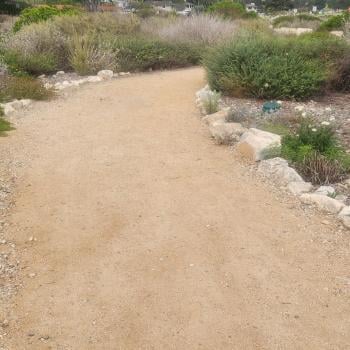Jonathan Malesic‘s stunning reflection on life with the monks of New Mexico’s Monastery of Christ in the Desert crystallizes the problem of Americans and work. When Malesic goes out into the wilderness to spend a few days with the Benedictines, he knows he might encounter demons.
He remembers that Desert Father and third-century monk St. Antony “said that if you go to the desert but don’t renounce all the things of this world, the demons will tear at your soul in the same way wild dogs would tear at a man who walked through town wearing meat on this otherwise naked body.” The devils Malesic meets are not the expected ones. His noonday demon is not sloth. What haunts him is not rest but work, or, particularly, American sensibilities about work. “Over several days of working and praying and eating with the monks, I realized that the ceaseless, obsessive American work ethic was one of those demons.” The sin does not beset Malesic alone: “We are a society almost totally under its power. We assess people’s value by their jobs. We forego vacation time, anxious to prove that we’re indispensable. We drive ourselves to burnout, and we do all this even while artificial intelligence promises to take over our jobs. The demon is chasing us over a cliff.”
Malesic resists the devil with the monks’ help. The monks battle the demon not by denying work—they still do plenty—but by subordinating it to the other priorities of their life, life together in prayer and contemplation.
The monks have a compelling work ethic. Historically, monasteries undertake a craft to support their living, copying manuscripts, making cheese or jam or beer. In the 1990s, these Benedictines arrived at a work both traditional and innovative, serving as scribes of a sort, doing web design. They worked hard to handle demand for their wildly popular digital scriptorium. Business boomed. Then they shut it down, in 1998. The monks found that the business interfered with other aspects of community life, like praying the Hours. Malesic explains their decision: “Possessed by the spirit of capitalism, it would hire more workers. But the monks can’t do that, not without thwarting the reason they went to the desert in the first place. So they quit.”
A bell wakes the monks at 3:30 am and they gather at 4 for Gregorian chant. It is the first Liturgy of the Hours. Monday morning they read St. Paul’s exhortation to the Thessalonians that anyone who does not work won’t eat. Later in the morning, they work for nearly three hours. They break and ready for lunch, with the rest of the day spent alternating silent contemplation and community nurture with prayer, having, as Malesic quips, “upheld their end of Paul’s bargain.” With the dignity-of-labor ideas of Pope John Paul II shaping his meditation, Malesic reflects, “A quarterly profit goal isn’t worth as much as the person who labors, at the cost of her health, to meet it. No reputation for customer satisfaction is worth as much as the person who fills orders and endures complaints. Your pride in a job well done, or your anxiety, or your ego: none of those is worth as much as your dignity as a person.”
The monastic schedule cannot be adopted by all. The problem with work can be work itself, or those other lusts of the flesh and desires of the eyes acquired by work’s earnings. But in Malesic’s telling, the problem is not work but our specifically American work ethic.
To rue something called an American work ethic, though, is to run into ideas held by a very different group of community-oriented, highly observant Christians highly influential in shaping American work culture, the settlers of seventeenth-century Massachusetts Bay Colony and its environs, the Puritans. These settlers set up towns and farms, factories and fisheries, with a kind of holy zeal because they thought their work deserved it. They did so not because they admired the work itself, or hoped to gain luxury by doing it, but because they understood their work as a venue for the expression of commitment and service, because God had given them opportunity. Indeed, God expected them to work as, in the words of one of their preachers, God had sent humans forth to live “not in a Play-house, but a Work-house.” Their labor, mixed with a cold, rocky wilderness, yielded a churning, burgeoning economy and facilitated social mobility, with church and government collaborating. The American work ethic troubling Malesic might be chalked up to what happened when Puritans became Yankees, when the God part dropped out of motivation generating long zealous work days.
I would argue that the fault is not our ethic of work but our imagination of it. Like many temptations, the sin is not in the thing itself but what we do with it. Some people may not want to do work, but that is not the sin to which Malesic thinks most Americans are prone. Instead, we are likelier to like work too much, lodge identity in it, lord it over each other and over creation, think creation itself would grind to a halt without our contribution. Work can show dignity but it also can become a dodge, a way to elude what else matters. The temptation seems deadlier to people with high-status, high-salary jobs. Those whose jobs may be done with dignity but no particular delectation may find it easier to put them away when the shift ends. The monks, after all, stop working not because they have wrapped things up but because the time allocated to it for the day has expired and they have more important things to do. As Malesic writes,
“Un travail de bénédictin—literally, a Benedictine labor—is a French expression for the sort of project someone can only accomplish over a long time through patient, modest, steady effort. It’s the kind of thing that can’t be rushed: illuminating an entire Bible, writing a thousand-year history, recording the position of stars at each hour of the night and each day of the year. It’s work that doesn’t look good in a quarterly earnings report. It doesn’t maximize billable hours. It doesn’t get overtime pay. But it’s a way to work without the anxiety that drives us to put in long, intense hours and uproot our lives every few years in pursuit of “better” jobs.”
There is always more work to do, but it will be there the next day, so it can be shelved. This is an insight mothers of young children often possess as well.
Desert monks and New England Puritans have more in common than they might own at first. Both suggest work matters to God. Both suggest wholeheartedness and service in labor. Both put work away when it is time to turn attention instead to human companionship and worship and rest. I agree with Malesic, who writes, “I don’t think we all have to join monasteries to live the good life. But the monastic principles of constraining work and subordinating it to moral and spiritual well-being might help us keep our demons at bay and recover the dignity in our labor and in ourselves.”
















